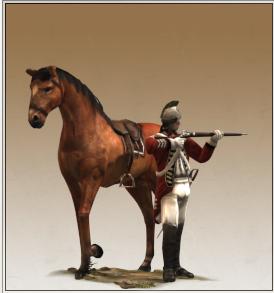Difference between revisions of "Colonial Dragoons (ETW Unit)"
(→Overview) |
Tango12345 (talk | contribs) (sorting out) |
||
| Line 1: | Line 1: | ||
| − | {{Unit|image=[[Image:Dragoon_thumbnail.jpg]]|Class=Dragoons|Men=80| | + | {{Unit|image=[[Image:Dragoon_thumbnail.jpg]]|Class=Dragoons|Men=80|Weaponry=Swords and Carbines|Minimum Building Requirement=Army Encampment|Region=The Americas|Recruitment Cost=950|Upkeep Cost=280|Technology Needed=Carbines}} |
| − | == | + | ==Overview== |
Horses give mobility, not shock value in combat. Dragoons do not charge home, but ride to critical spots on a battlefield where infantry firepower is needed. They carry smooth-bore, muzzle-loading muskets with shortened barrels (to make reloading easier) originally called “dragons” or dragoons; over time, this name transferred to the men. | Horses give mobility, not shock value in combat. Dragoons do not charge home, but ride to critical spots on a battlefield where infantry firepower is needed. They carry smooth-bore, muzzle-loading muskets with shortened barrels (to make reloading easier) originally called “dragons” or dragoons; over time, this name transferred to the men. | ||
| − | |||
Dragoons are also useful for riot control and civil suppression (“dragooning” is to bully people into a course of action). Their usefulness as infantry and “cheap” cavalry means that they can put down all kinds of trouble, as cutting down civilians is beneath the dignity of proper cavalry regiments. | Dragoons are also useful for riot control and civil suppression (“dragooning” is to bully people into a course of action). Their usefulness as infantry and “cheap” cavalry means that they can put down all kinds of trouble, as cutting down civilians is beneath the dignity of proper cavalry regiments. | ||
| − | |||
Historically, dragoons slowly became cavalry soldiers like any other, and stopped fighting as mounted infantry, although many regiments did retain the name. The cavalry had always regarded them as (lower paid) social inferiors, and the infantry had resented them as not being proper footsloggers, so the dragoons welcomed their new acceptability. | Historically, dragoons slowly became cavalry soldiers like any other, and stopped fighting as mounted infantry, although many regiments did retain the name. The cavalry had always regarded them as (lower paid) social inferiors, and the infantry had resented them as not being proper footsloggers, so the dragoons welcomed their new acceptability. | ||
| − | == | + | ==Unit details== |
| − | |||
| − | |||
| − | |||
| − | |||
| − | Most nations cannot utilize | + | Like their European counterparts, colonial dragoons can act as a light cavalry force as well as quick-response firepower thanks to their carbines. All dragoons have the option to dismount and act as infantry; however, they are still ill-suited for taking on proper line infantry due to their inferior numbers. |
| + | Unlike their light counterparts, colonial dragoons may not fire while mounted and may only use their carbines while dismounted. This relegates them to be a mixture of slightly inferior line infantry or inferior light cavalry, but not both at once. However, colonial dragoons boast flexibility in use that is unmatched by any cavalry or infantry regiment. | ||
| + | Most nations cannot utilize cavalry formations with dragoon, however, the British can order their dragoons to use wedge or diamond formation for dragoons as soon as the technologies are researched. | ||
==Factions== | ==Factions== | ||
Revision as of 08:21, 18 February 2012
Overview
Horses give mobility, not shock value in combat. Dragoons do not charge home, but ride to critical spots on a battlefield where infantry firepower is needed. They carry smooth-bore, muzzle-loading muskets with shortened barrels (to make reloading easier) originally called “dragons” or dragoons; over time, this name transferred to the men. Dragoons are also useful for riot control and civil suppression (“dragooning” is to bully people into a course of action). Their usefulness as infantry and “cheap” cavalry means that they can put down all kinds of trouble, as cutting down civilians is beneath the dignity of proper cavalry regiments. Historically, dragoons slowly became cavalry soldiers like any other, and stopped fighting as mounted infantry, although many regiments did retain the name. The cavalry had always regarded them as (lower paid) social inferiors, and the infantry had resented them as not being proper footsloggers, so the dragoons welcomed their new acceptability.
Unit details
Like their European counterparts, colonial dragoons can act as a light cavalry force as well as quick-response firepower thanks to their carbines. All dragoons have the option to dismount and act as infantry; however, they are still ill-suited for taking on proper line infantry due to their inferior numbers. Unlike their light counterparts, colonial dragoons may not fire while mounted and may only use their carbines while dismounted. This relegates them to be a mixture of slightly inferior line infantry or inferior light cavalry, but not both at once. However, colonial dragoons boast flexibility in use that is unmatched by any cavalry or infantry regiment. Most nations cannot utilize cavalry formations with dragoon, however, the British can order their dragoons to use wedge or diamond formation for dragoons as soon as the technologies are researched.
